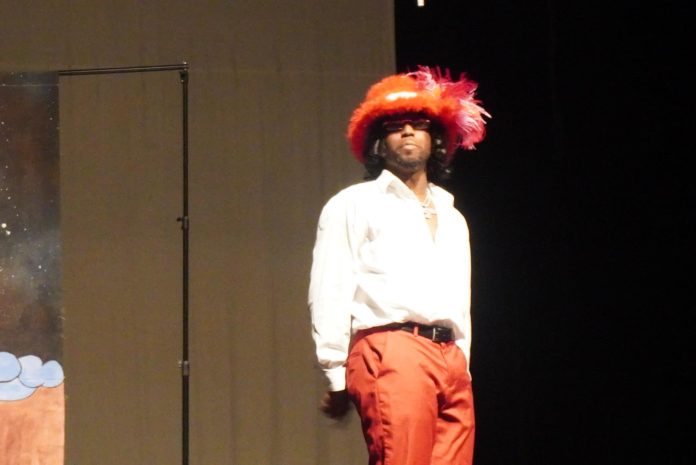
Photo by Cameron Adams
Cameron Adams
Editor-In-Chief
The African-American community has been on the receiving end of numerous false narratives and stereotypes since slavery times.
Fast forward hundreds of years later and black men and women continue to be held down by inaccurate depictions of their characters and culture.
On April 3, 2023, Jackson State University’s theatre organization, known as M.A.D.D.R.A.M.A, presented an exclusive performance which embraced and dispelled the inaccurate narratives placed on African-Americans.
The show began with eight Jackson State students displaying the colorful personalities of their characters. Each character represented a different stereotype of black men.
The stereotypes included, “The Dumb Athlete”, “Bubba Baxter: Prisoner #2023”, “Ice Man”, “Junebug Johnson: The Ladies Man”, “D-E-L-I-C-I-O-U-S: The Pimp”, “Killa Black: The Gangsta”, and “Alfalisha”.
“The Dumb Athlete” was played by JaShaun Wilkerson, a senior journalism and media studies major from Tunica, Miss. This stereotype displayed society’s description of a “typical” black athlete; A tall, athletic, black male, who succeeds on the court but struggles in the classroom.
Lil Charles, the name of Wilkerson’s character, was a college basketball player who appeared to have a third-grade level of comprehension.
The character had the crowd hysterical as he continued to express his frustration while reading the well-known kid’s tale, “Jack and Jill”.
Wilkerson claimed to enjoy playing this character since he was able to incorporate basketball into his performance. “My experience with the character Lil Charles was fun and I had a chance to mix my favorite sport with acting,” stated Wilkerson.
Another crowd favorite was “D-E-L-I-C-I-O-U-S: The Pimp”, played by Ethan Goode, a senior journalism and media studies major from Memphis, Tenn.
Delicious was a representation of the average pimp: an expressive and flashy black man who verbally and physically abuses several women who adhere to his every request.
The character made several “pimp-like” jokes and comments degrading women and openly discussed his abusive habits.
Goode claimed that his performance as Delicious gave him an opportunity to step out of his comfort zone.
“I have never played a pimp in a production nor have I ever had to perform on stage by myself for that long,” stated Goode. “It was a great experience and this definitely expanded my acting experience.”
Although Goode did not have much experience in being a pimp, he did have a history of being placed in a stereotype.
“I have been caught in the stereotype of being an only child. People think since I am an only child that I am spoiled,” claimed Goode.
While some people are comfortable with being categorized, Goode chose to overcome his stereotype. He stated that despite being an only child, he has never been given anything without working for it.
“Once you meet my parents, they will tell you I’ve always had to work for everything,” claimed Goode. Goode also displayed his ability to overcome stereotypes in the play.
After each character expressed their personality, the narrators of the play reintroduced the eight stereotypes in a new light.
The once humorous performance turned into an empowering segment, as the eight characters approached the stage in all-black suits. Each cast member held a distinct souvenir from their character and placed it in the trash, saying goodbye to their stereotypes.
Chair of the Department of Speech Communication and Theatre and producer of the play, Mark G. Henderson, claimed that the message of the performance closely relates to society’s depiction of African-American culture.
“The message of the play is that we, as black people, both male and female, need to listen less to how society labels us and more to how we label ourselves,” stated Henderson.
Although the play was based on today’s society, Henderson said he wrote the play over 20 years ago.
“I actually wrote it 1998 and have been presenting new and improved versions of it since then,” said Henderson.
As “New Beginnings” continues to inform the African-American community about the importance of rewriting the narrative, Henderson hopes that his role as a theatre practitioner will also encourage change.
“All of us play a part in changing the narrative. As a theatre practitioner, this play represents my little contribution to help uplift and positively promote the African-American culture, specifically the Black male,” Henderson said.

